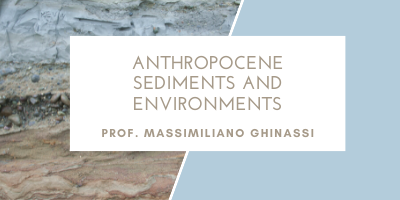Anthropocene Sediments and Environments

Period: first semester
Course Units Contents:
Anthropocene historical genesis and possible definitions: an interdisciplinary approach
The Anthropocene Concept (1 CFU):
Definition, identification, and interdisciplinary meaning of the Anthropocene (geology, biology, economics, sociology), with focus on geological markers and historical background. Key topics: Chemostratigraphic and lithostratigraphic markers; Biodiversity loss; Technofossils and technostratigraphy; Planetary Boundaries: Human impact on Earth system thresholds and implications for sustainability.
Measuring microplastics in sediments (1 CFU)
Sampling methodologies, Processing tools for extraction of microplastics particles; Physical properties and classification; Analytical techniques for quantification and identification
The source to sink perspective and the depositional environments in the Anthropocene time (4 CFU): soils and soil erosion; Alluvial and lacustrine depositional systems; Coastal depositional systems; Deep marine depositional systems; Microplastic production (the source system) and their hydrodynamic behaviour in different sedimentary environments
Planned learning activities and teaching methods:
The course will be based on classroom, lab, and field teaching, incorporating student-centered methodologies designed to actively engage students throughout the learning process. These activities will include flipped class rooms and practical activities related to elaboration of data collected in the field at a specific study case. Qualified lecturers, selected among the major experts on subjects of the course, will be invited to hold webinar.
Teaching methods may be adapted to accommodate specific student needs (e.g., fieldwork limitations) provided that these needs are communicated to the instructor through the appropriate institutional procedures. Similarly, individual and flexible learning paths may be arranged for students with certified SEN or SLD, depending on feasibility and in accordance with institutional policies. In addition to contacting the course instructor, students with disabilities, specific learning disorders, special educational needs, or other health conditions may reach out to the Student Services Office – Inclusion Section to receive more information about available teaching support and tools.
At the end of the course, students will be invited to complete a survey aimed at collecting feedback and suggestions to support the improvement of future editions.
The use of AI tools to prepare the presentation for flipped classroom is permitted; however, any such use must be explicitly acknowledged in the presentation slides.
